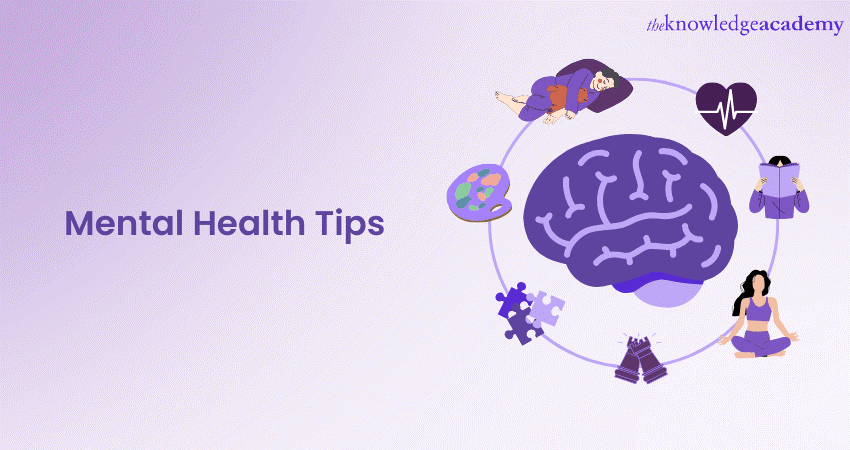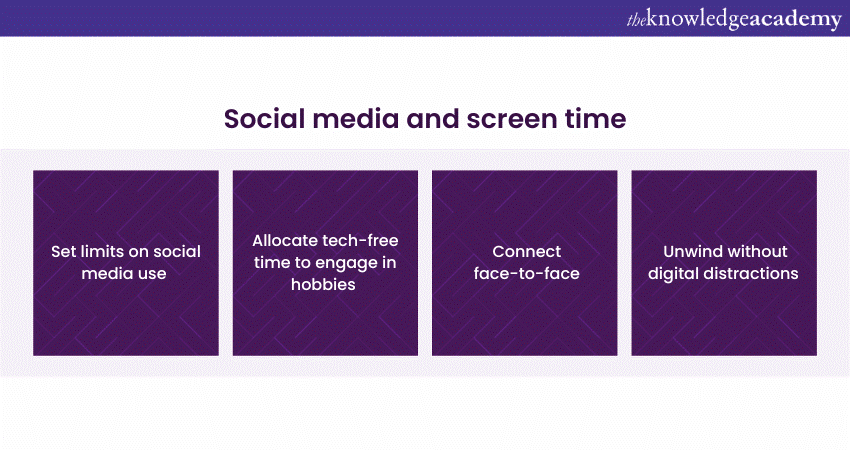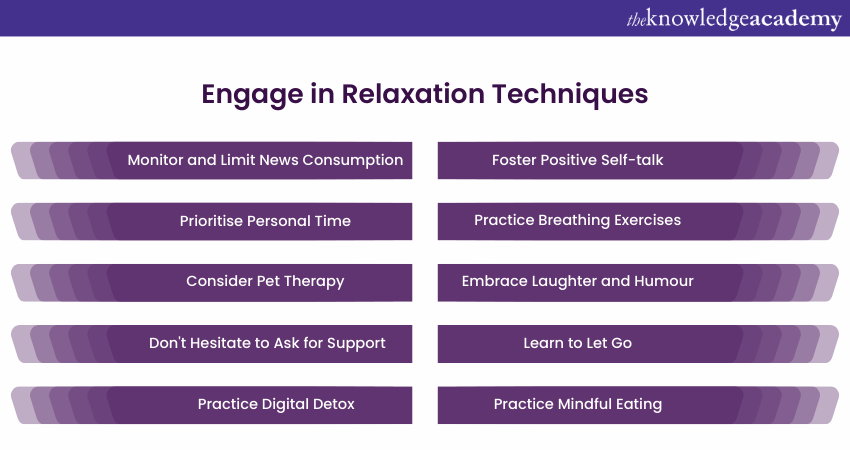We may not have the course you’re looking for. If you enquire or give us a call on +1 7204454674 and speak to our training experts, we may still be able to help with your training requirements.
We ensure quality, budget-alignment, and timely delivery by our expert instructors.

Life moves fast, and with all the stress and challenges we face, taking care of our mental health is more important than ever. It affects how we think, feel, and interact with the world—shaping our relationships, work, and overall happiness.
The good news? There are simple ways to protect and improve your mental well-being! In this blog, we’ll share top Mental Health Tips to help you feel more balanced, reduce stress, and get back on track when life feels overwhelming. Let’s dive in!
Table of Contents
1) What is Good Mental Health?
2)Tips to Improve Your Mental Health
a) Prioritise Sleep
b) Practice Mindfulness and Meditation
c) Stay Physically Active
d) Cultivate a Supportive Social Circle
e) Limit Social Media and Screen Time
f) Seek Professional Help When Needed
g) Practice Gratitude Daily
h) Engage in Creative Activities
i) Set Realistic Goals
j) Maintain a Balanced Diet
3) What are Some Mental Health Tools That you Can Use?
4) Conclusion
What is Good Mental Health?
When was the last time you took good care of your Mental Health? Is it a long time ago? Well! Some people think about taking care of their Mental Health when they feel stressed, anxious, or low. Are you someone like that?
Mental Health is something we should focus on all the time, just like we care about our physical health. When we look after our mental well-being, we feel better from the inside. It will help you become more prepared to handle tough times later. Plus, it can even help reduce the risk of physical health problems in the long run. So, start making it your priority from today.
Tips to Improve Your Mental Health
Let's explore some of the best tips to improve Mental Health:

Prioritise Sleep
If you've ever had a bad night's sleep, you know how much it affects your body, mind, and ability to handle daily life. Everyone experiences nights of poor sleep, and for some, getting enough rest feels impossible.
When mental health struggles arise, sleep is often the first thing to suffer. Adults need 7 to 9 hours of sleep each night, including both deep and dream sleep. If sleep has been a challenge, a few simple changes might help:
1) Create a relaxing bedtime routine to help wind down before sleep.
2) Avoid screens, caffeine, alcohol, and intense exercise before bed to improve sleep quality.
3) Stick to a regular sleep schedule, even on weekends, to support a steady sleep cycle.
4) Small adjustments can make a big difference in improving sleep and overall well-being.
Practice Mindfulness and Meditation
Engage in mindfulness by focusing on the present moment. Meditation can reduce anxiety and improve emotional well-being. Start with short sessions, focusing on your breath. Over time, this practice can help you manage stress and gain better control over your thoughts.
Stay Physically Active
Our body and mind are connected, so taking care of one helps the other. Staying active boosts both physical and mental health. Moving your body—whether it’s dancing, cycling, walking the dog, or even cleaning—helps reduce stress, improve sleep, and boost confidence.
Exercise also releases feel-good hormones that lift your mood. If you join a class, team, or group, the social connection makes it even better for your mental well-being. You don’t have to be an athlete to feel the benefits. Whether it’s walking, dancing, or going to the gym, just do what you enjoy!
Cultivate a Supportive Social Circle
Maintaining strong social connections is vital for Mental Health. So, nurture relationships with friends and family. Share your feelings and listen to others. A supportive network helps develop a sense of belonging and a safety net during challenging times.
Limit Social Media and Screen Time
Excessive screen time can lead to comparison and feelings of inadequacy. To reduce screen time, you can follow these tips :

a) Set limits on social media use
b) Allocate tech-free time to engage in hobbies
c) Connect face-to-face
d) Unwind without digital distractions
Seek Professional Help When Needed
If you're struggling, don't hesitate to seek help from Mental Health professionals. Therapists, Counsellors, and Psychiatrists can provide guidance and strategies tailored to your needs. It's a sign of strength to ask for support for Mental Health Counselling.
Practice Gratitude Daily
Take a few minutes each day to reflect on what you're grateful for. This practice can shift your focus towards positivity, fostering a more optimistic outlook on life.
Engage in Creative Activities
Creative outlets like art, music, and writing can be therapeutic. They offer a way to express emotions, reduce stress, and promote mindfulness. You don't need to be an expert – the process matters more than the outcome.
Set Realistic Goals
Goal setting gives a sense of purpose. So, begin by breaking larger goals into smaller, achievable steps. Also, celebrate your progress along the way. Meeting milestones boosts self-esteem and motivation.
Maintain a Balanced Diet
What we eat and drink affects our body, brain, and mood—for better or worse. Sugary snacks and drinks give a quick energy boost, but they leave us feeling tired or restless soon after. The same goes for caffeine in coffee, tea, and energy drinks. Eating a balanced diet with plenty of fruits and vegetables is key to good physical and mental health.
How we eat matters too. Sharing meals with family, friends, or colleagues helps build strong relationships, which is great for mental well-being. Food and emotions are often linked. Some people eat more or less when they feel upset. If this happens, talking to someone we trust or getting support can help.
Boost your wellbeing with the Health and Wellbeing PDF. Get it now!
Stay Hydrated
Dehydration can affect mood and cognitive performance. Thus, try to drink 2 litres of water a day, at least. Herbal teas and infused water are also good options. Remember to stay mindful of your body's hydration needs.
Limit Caffeine and Alcohol Intake
High caffeine intake can increase anxiety, while excessive alcohol consumption can worsen mood disorders. Moderation is key. So, opt for herbal teas or decaffeinated options and limit alcohol to recommended guidelines.
Learn to Say No
Setting boundaries is crucial for mental well-being. Politely decline tasks or commitments that overwhelm you. Moreover, prioritise your own needs without feeling guilty.
Embrace Nature and the Outdoors
Life comes with worries, stress, and tough times, but nature can be a great way to calm the mind. For thousands of years, we’ve lived around animals and plants, and many people find that nature helps them feel calmer, more hopeful, and less alone.
In Japan, people practise "forest bathing", which involves simply spending time in nature to boost mental well-being. Walking through a forest, listening to birds, and feeling the fresh air can help clear your mind.
To get the most out of nature, slow down and notice what’s around you—the trees, birds, and even the sound of water. Take a deep breath and see how you feel. Connecting with nature can work wonders!
Journaling for Self-expression
Jot down your thoughts in a journal. This practice can help you in the following :

a) Processing emotions
b) Gaining insights into your thought patterns
c) Alleviating emotional tension
Establish a Consistent Routine
A routine provides structure and predictability, which can be comforting. Include regular sleep, meals, exercise, and leisure time. Remember that consistency can improve mood and overall mental stability.
Develop Healthy Coping Mechanisms
Instead of turning to harmful habits when stressed, opt for healthy coping strategies. These might include the following:
a) Deep breathing
b) Progressively relaxing your muscles
c) Engaging in a calming hobby
Learn effective anxiety management strategies with our Anxiety Courses – Sign up now!
Challenge Negative Thoughts
Feeling upset can make daily life harder, affecting work, sleep, and relationships. Sometimes, we know we’re upset but can’t tell if it’s sadness, anger, or something else. It helps to accept feelings without judgment instead of thinking we’re weak.
If you notice your mind spiraling or obsessing over these feelings, it could be a sign that you’re overthinking. One effective way to stop overthinking is by acknowledging and naming your emotions. Try saying, “I feel irritable but also sad,” and think about what caused it—maybe a disagreement or even hormones. Be kind to yourself, just as you would to a friend in need. It might feel odd, but it helps.
Writing down feelings in a notebook or phone can also help—just make sure to keep it private if needed. Try repeating a positive phrase like, “I am learning and growing.” This can help shift negative thoughts and boost your mood.
Volunteer or Help Others
Helping others creates a sense of purpose and contributes to feelings of happiness. So, volunteer in non-profit organisations, help needy ones, provide assistance to friends, or engage in random acts of kindness.
Engage in Relaxation Techniques
Experiment with relaxation methods like deep breathing, visualisation, or progressive muscle relaxation. These techniques can reduce stress and promote relaxation.

Monitor and Limit News Consumption
Constant exposure to negative news can increase anxiety. Stay informed but set limits on news consumption. More importantly, choose reliable sources and allocate specific times for catching up on current events.
Prioritise Personal Time
Schedule regular breaks for activities you enjoy. Whether it's reading, taking a bath, or pursuing a hobby, personal time rejuvenates your mind and spirit. Taking a break for activities you like can derail your chain of negative thoughts, and you will feel relaxed.
Reduce stress and build resilience with our Mindfulness Training – Register now!
Consider Pet Therapy
Interacting with animals can release oxytocin, a hormone that promotes bonding and reduces stress. If possible, spend time with pets or consider adopting one.
Balance your body and mind naturally – Follow these Ayurvedic Health Tips!
Don't Hesitate to Ask for Support
Remember that seeking help is a strength, not a weakness. Reach out to friends, family, or professionals when you need assistance. You don't have to navigate challenges alone.
Practice Digital Detox
Regularly disconnect from screens and the online world. Designate tech-free periods, such as during meals or before bed. Engage in offline activities that bring joy and allow you to be fully present in the moment.
Foster Positive Self-talk
You can follow these Mental Health Tips to foster positive self-talk:
a) Pay attention to your inner dialogue
b) Replace self-criticism with self-compassion
c) Treat yourself as you would a friend
d) Offer yourself kind and supportive words in times of difficulty
Practice Breathing Exercises
Any deep breathing exercises, like the 4-7-8 technique, can rapidly reduce stress. The process is simple: inhale for 4 seconds, hold for 7, and exhale for 8. Repeat several times to trigger a calming response.
Embrace Laughter and Humour
Laughter truly is a powerful medicine. Watch a funny movie, read a humorous book, or spend time with people who make you laugh. Laughter releases endorphins and eases tension.
Learn to Let Go
Recognise that you can't control everything. Accept what you can't change and focus your energy on aspects within your control. This mindset shift reduces unnecessary stress.
Practice Mindful Eating
When you eat, pay attention to each bite and savour the flavours, textures, and aromas. Mindful eating not only enhances the sensory experience but also fosters a healthier relationship with food.
Do you want to take a break, breathe, and invest in your mental wellness? Join our Mental Health Courses today!
What are some Mental Health tools that you can use?
Technology is not only making our lives smooth but also helping us maintain our Mental Health. Here are some tools that you can use to improve your Mental Health:
a) Artificial Intelligence (AI)
AI and Machine Learning in smartphones help track mood swings and predict mental health episodes. They analyse voice patterns and assist during therapy. Guided meditations and mindfulness exercises support everyone's well-being. These tools make mental health care more accessible and effective.
b) Virtual Reality (VR)
Virtual Reality (VR) has played a huge part in helping individuals who suffer from anxiety or Post Traumatic Stress Disorder (PTSD). They create virtual environments, which help them calm down and relax their stressed nerves. They also help people to get over social anxiety through virtual simulations.
c) Digital games:
Digital Games have surprisingly proved to be one of the best tools to help people recover from Mental Health disorders. These games are therapeutic and help people process their feelings and thought processes. These are generally non-violent and have reportedly saved many people from falling again into depressive episodes.
d) Minnesota Multiphasic:
Personality Inventory (MMPI-2) is one of the most used Psychometric tests that is used globally. It has helped in measuring Mental Health illnesses. It is a scale that features 567 true-false statements, which helps assess these clinical illnesses, including Hypochondriasis, Depression, Hysteria, Psychopathic deviation, Paranoia, Schizophrenia, Hypomania, Social introversion, etc.
e) Beck Anxiety Inventory
Beck Anxiety Inventory is another test that people can use to self-assess their anxiety levels. If people think that they have anxiety, they can use this test to determine the severity of the anxiety and seek help immediately.
Unlock the connection between food and mood with the Nutrition and Mental Health PDF!
Conclusion
Incorporating these diverse tips to boost your Mental Health can significantly enhance your overall well-being. Remember, nurturing your Mental Health is an ongoing journey shaped by daily choices. So, adhere to these Mental Health Tips and step towards building a happier and healthier you.
Get a deeper understanding of Mental Health with our Psychology Course – join now for a journey towards enhanced well-being
Frequently Asked Questions
How to Heal Your Mind?

Take care of yourself with rest, mindfulness, and positive thinking. Express emotions through journaling or talking to someone. Do things you enjoy, like music, reading, or nature walks. Eat well, stay active, and get enough sleep. If needed, seek professional support—healing takes time, but small steps make a big difference.
How to be Strong Mentally?

Build resilience by staying positive, learning from challenges, and setting boundaries. Take care of your body with exercise, sleep, and healthy food. Surround yourself with supportive people, practice gratitude, and develop coping skills. Mental strength grows with self-care, patience, and a strong mindset.
What are the Other Resources and Offers Provided by The Knowledge Academy?

The Knowledge Academy takes global learning to new heights, offering over 30,000 online courses across 490+ locations in 220 countries. This expansive reach ensures accessibility and convenience for learners worldwide.
Alongside our diverse Online Course Catalogue, encompassing 19 major categories, we go the extra mile by providing a plethora of free educational Online Resources like News updates, Blogs, videos, webinars, and interview questions. Tailoring learning experiences further, professionals can maximise value with customisable Course Bundles of TKA.
What is The Knowledge Pass, and How Does it Work?

The Knowledge Academy’s Knowledge Pass, a prepaid voucher, adds another layer of flexibility, allowing course bookings over a 12-month period. Join us on a journey where education knows no bounds.
What are the Related Courses and Blogs Provided by The Knowledge Academy?

The Knowledge Academy offers various Mental Health Courses, including Mental Health and Wellbeing Training, Mental Capacity Training and Mindfulness Training. These courses cater to different skill levels, providing comprehensive insights into How to Stop Overthinking.
Our Health & Safety Blogs cover a range of topics offering valuable resources, best practices, and industry insights. Whether you are a beginner or looking to advance your skills in Health & Safety, The Knowledge Academy's diverse courses and informative blogs have you covered
Upcoming Business Skills Resources Batches & Dates
Date
 Mental Health and Wellbeing Training
Mental Health and Wellbeing Training
Fri 11th Apr 2025
Fri 13th Jun 2025
Fri 8th Aug 2025
Fri 26th Sep 2025
Fri 21st Nov 2025






 Top Rated Course
Top Rated Course



 If you wish to make any changes to your course, please
If you wish to make any changes to your course, please


